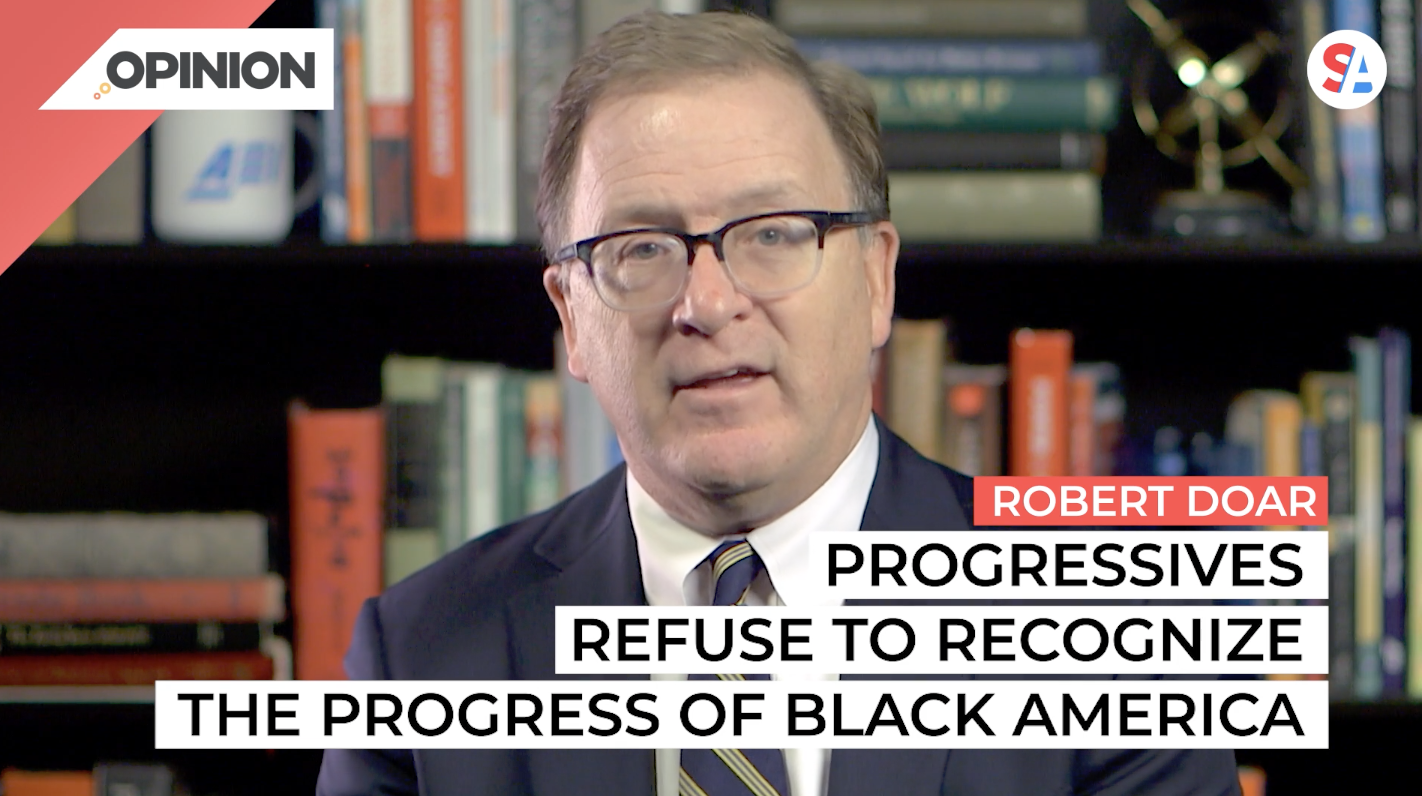
Commentary
-
Our commentary partners will help you reach your own conclusions on complex topics.
When progressives in politics and the media talk about race in America, they too often fail to acknowledge the progress we’ve made. Instead, we hear that America is a systemically racist country, and that conditions in America for Black people and other minority groups are no better than they’ve ever been.
This narrative features in the popular works of “anti-racist” pundits that often appear on best-seller lists and opinion pages. Best-selling author Robin DiAngelo even suggests that “racism’s [modern] adaptations over time are more sinister than concrete rules such as Jim Crow.”
Sometimes President Biden doesn’t sound much better. “The 21st century Jim Crow assault is real,” the President insisted in a speech last July.
Now I have a personal stake in this argument. I believe the civil rights movement led to significant and lasting positive change, partly because I saw my father play a role in that change. During his time working in the Justice Department’s Civil Rights Division under three presidents, John Doar helped to move the country forward by helping to integrate Southern universities, prosecuting the murders of civil-rights activists, and bringing the first successful voting rights cases in federal courts in the South. Dad’s record led President Obama to say in recognizing his efforts: “I might not be here had it not been for his work.”
President Obama was right to recognize the opportunities that the civil rights movement created for Black political participation. In 1965, when the Voting Rights Act was passed, there were 5 Black representatives and 0 Black senators. In 1967, the Republican Edward Brooke of Massachusetts became the first Black senator since Reconstruction. And now, at the start of this Congress last January, there were 57 Black representatives and 3 Black senators.
These gains have not just been in congressional representation, but at all levels of our democracy, and even in places of historical adversity. Mississippi, for example, was the epicenter of Jim Crow and had 0 Black state legislators in 1965. In 2021, there were 51 of them. Similar patterns can be seen across the country, where Black representation has made significant but lasting progress.
We can say the same about Black voters more broadly. According to the University of Florida’s US Elections Project, Black voter participation has risen from 46.8% in 1988 to 65.6% in 2020. During the 2020 Democratic primaries, Black votes were key to Joe Biden’s victory and were so again in the general election versus Donald Trump.
Today, Black voters can easily vote in ever-growing numbers, and they can vote for candidates of any race or party. Those facts alone shows a massive improvement since the Jim Crow-era.
But these improvements for Black Americans go beyond just political participation, and reach into all aspects of life. Black representation has also improved along the range of the income scale; millions of Black men are now in the top income bracket. Many millions more have been lifted out of hardship by a 45% rise in their median incomes and the massive reduction in, properly-measured, poverty since the 1990s.
This growing wealth is backed up by improvements in educational attainment and decision-making. In 2020, the Census Bureau reported that 88% of Black Americans now had a high school diploma, an all-time high and just shy of the national average of 90%. In 1940, it was just 7%. The percentage of Black adults with four-year degrees rose from less than 1% in 1940 to 26% today. Disparities in teen pregnancy rates have also narrowed, as the national average has plummeted since the 1990s – which is another success that the Left doesn’t acknowledge.
In sum, Black Americans today enjoy legal equality and voting rights, substantial political representation, an improving quality of life, and much better opportunities for work and education.
These are all things they didn’t have under the Jim Crow era that President Biden so wrongly compares to modern America. And all of this was achieved peacefully and gradually. What other country has done so much to extend freedom and opportunity to all its citizens, regardless of race?
Of course, all of this progress is not enough for today’s progressives, who demand something called equity, which is another way of saying “equality of outcome.” They’ll argue that better isn’t good enough, and that Black outcomes need to match White outcomes, and must be made to match through government action. That’s not a controversial opinion on the American Left. It’s in the Democratic Party’s platform, which says, “race-neutral policies are not sufficient to rectify race-based disparities.”
Focusing on “equity” and “anti-racism” distracts from the underlying problems like family formation and neighborhood safety that cause worse outcomes for Black Americans. These issues cause hardships for Americans of all races, but research shows they’re especially prevalent among Black Americans and are responsible for many of the challenges that progressives blame on discrimination.
Progressives’ rhetoric also distracts us from how united and free we really are, and how much promise our country holds for people of all races. Polling shows that Americans are more comfortable with having neighbors of a different race than are the citizens of most European and Asian countries. Our legislatures are among the most racially and ethnically diverse in the world. And the United States is still where millions of non-White immigrants want to come in search of a better life.
By dismissing the progress we’ve made, progressives sow division and obstruct Black Americans’ efforts to move up. The truth is — there are no race-based solutions to the problems Black Americans face, or to the problems our country faces. The promise of this country has been to offer people freedom and opportunity regardless of their color or creed. It once seemed like empty rhetoric, but generations of Americans, of all races, have worked to make that promise a reality. Denying the progress accomplished by past civil-rights heroes is a disservice to them and our future.
-
Affirmative action ruling consistent with struggle against US racist past
When the Supreme Court struck down affirmative action programs at the University of North Carolina and Harvard, conservatives celebrated the decision, hailing it as a victory for a “colorblind” interpretation of the Constitution. Former President Donald Trump praised the ruling as a “great day for America.” Democrats, on the other hand, criticized the decision, arguing…
-
End of pandemic SNAP benefits a chance to improve food program
Millions of struggling American families in 32 states are now receiving less federal aid to buy food as the emergency funding for the SNAP food stamps program has expired. The emergency allotment, spurred by the COVID-19 outbreak, boosted the money that recipients received by at least $95 per month from SNAP, which stands for “supplemental…
-
Census data paints an inaccurate picture of inequality in America
The U.S. Census Bureau is a nonpartisan government agency, responsible for not only determining how many representatives each state will have in Congress for the next 10 years, but also for collecting income data. By asking about income, the Bureau’s intent is to “help communities enroll eligible families in programs designed to assist them.” But…
-
Elites have lost the trust and confidence of Americans
The Cambridge Dictionary defines the liberal elite as “a group of people with education, money, and other advantages, often living in cities, who have liberal political views and are seen as not understanding the problems and views of ordinary people.” Former President Donald Trump’s war on elites was central to his 2016 campaign and could be weaponized again should he run in 2024. Straight Arrow News…
-
American men need to start taking more personal responsibility
Some members of the Republican party, such as former President Donald Trump and Sen. Josh Hawley (R-MO), blame Democrats for starting a war against American men. These voices want government action taken to protect men from policies meant to undermine their roles in society. But is government intervention really the answer? Straight Arrow News contributor Robert…
Latest Opinions
-
 Getty Images
Getty Images
France in need of air defense for Paris 2024 Games, asks Greece for help
-
 Getty Images
Getty Images
US troops begin building pier Gaza aid just days after mortar attack
-
 Getty Images
Getty Images
New CISA cybersecurity measures to fight ransomware raise privacy concerns
-
 Getty Images
Getty Images
How Mexican president’s cheery claims about drug cartels denies reality
-
 AP Images
AP Images
San Diego labeled the 'new epicenter' of the Southern Border crisis
Popular Opinions
-
In addition to the facts, we believe it’s vital to hear perspectives from all sides of the political spectrum.


